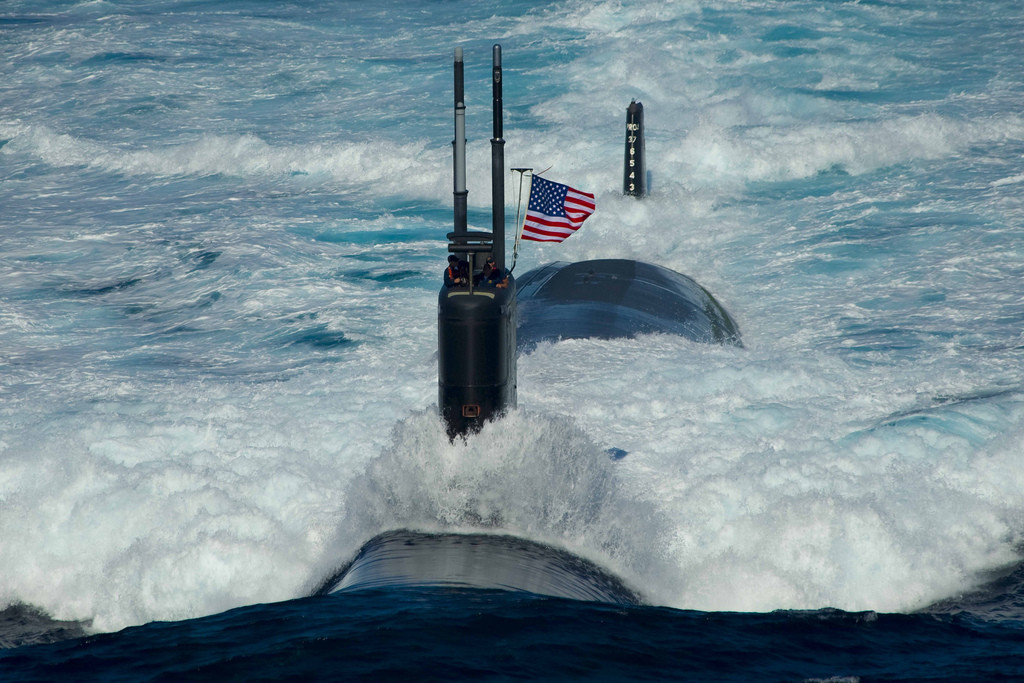U.S. Submarines: To Stealth or not to Stealth?

Et tu, Representative Forbes, et tu? Earlier this week, asked whether the U.S. Navy is “over-investing in submarines,” the redoubtable Seapower and Projection Forces Subcommittee chairman maintained that the “U.S. advantage in the undersea domain, which did so much to secure victory in the Pacific in World War II and provide strategic stability during the Cold War, will remain an essential American competitive advantage for years to come.”
Not much objectionable here. Except the premise of the question is that I predicted an end to the age of underwater stealth, and the competitive advantage it has long bestowed on U.S. Navy mariners. Rep. Forbes responded based on that premise. His answer is reasonable, if a mite overconfident, but the premise of the question is false. I predict nothing; I ask what if?
Indeed, you’ll look in vain for strong predictions in any of my writings. Maybe it’s growing up in the Deep South of the 1970s, where some sidewalk preacher or huckster was always prophesying that the end of the world was nigh unless we mended our sinful ways. (It ended during my honeymoon in 1988, as I recall. Or maybe it was 2012.) My reflexive assumption, then, is that anyone who claims to know the future — whether it’s a Bible thumper, or a scientist, or a scholar — is peddling snake oil.
Any soothsaying I hazard belongs to the Clubber Lang variety: vague, squishy, provisional.
To prepare yourself intellectually for uncertain times, though, it’s imperative to explore alternative futures. Sure, what Forbes says about undersea combat may hold. I hope it will. The laws of physics may mask quiet subs’ whereabouts into the indefinite future. The competition will remain in the realm of acoustics. Shipwrights will keep doing their utmost to eliminate noise, while anti-submarine forces construct sensors able to detect ever more minute sound signatures.
In short, passive defenses against detection, tracking, and targeting may suffice — as they have for decades. But what if not? Human ingenuity could expand the competition beyond the acoustic arena, making the depths a far more contested battleground than in the past. In this case I was riffing on someone else’s informed guesswork about that possibility, namely Bryan Clark’s. The thesis of my article boils down to: if Bryan is right, what then?
Bottom line, if foretelling some radical break with past trends has its perils, so does concluding that past performance guarantees future results. Submariners — and friends of the silent service — must not fall prey to the oldest false syllogism in the book. Namely, it could be the case that the U.S. submarine force will retain its advantage of stealth; I want it to be the case that the U.S. submarine force will retain its advantage of stealth; therefore it is the case that the U.S. submarine force will retain its advantage of stealth.
No. Nothing is fact because it could be and we want it to be. Nevertheless, it’s pretty safe to postulate, Clubber-style, that the underwater realm will grow increasingly contested in the coming years and decades. That’s the nature of competitive military interaction. Ergo, some questions to ask ourselves are:
- Will new technology render the seas partially or wholly transparent to sub hunters?
- To what technologies will the oceans become transparent? What are the new battlefields where high-tech thrust-and-parry will play out?
- Where will the tactical setting change: in the open oceans, near-shore waters, or both?
- How quickly will the setting change? How much leisure does the silent service have to adapt?
- How do submarine designs need to mutate to let subs protect themselves while harnessing new technology to extend their striking reach?
As the strategist Mr. Spock counsels, military advantages are the most fleeting of all. Tacticians and hardware designers, that is, must break new ground continually to stay ahead of their competitors. Indeed, it may be that Congress and the U.S. Navy are under-investing in preserving and expanding the sub force’s competitive advantage. To win we have to compete.
You wouldn’t argue with an eminent Vulcan, would you, congressman?
James Holmes is professor of strategy at the Naval War College.
Photo credit: Official U.S. Navy Imagery

